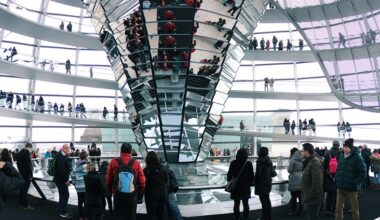Using Location Extensions to Target Local Customers
PPC advertising has transformed how businesses reach their desired audience. One critical aspect of effective PPC campaigns is the use of ad extensions, specifically location extensions. This feature enables businesses to display their physical address, phone number, and a map location directly in the ad. By incorporating location extensions, advertisers can significantly enhance their visibility among local customers. This approach is especially beneficial for brick-and-mortar stores looking to attract foot traffic. When users search for products or services on their devices, localized ads increase the likelihood that they will choose nearby businesses. For example, if someone searches for “coffee shop near me,” a well-structured PPC campaign utilizing location extensions can present the user with relevant information tailored to their geographic area. This seamless integration not only improves click-through rates but also drives higher conversion rates by connecting the right audience with the right business. Furthermore, when consumers are given clear directions to a store, they are more likely to visit and make purchases. In essence, leveraging location extensions is a powerful strategy within PPC advertising to engage local customers effectively.
Another critical advantage of utilizing location extensions in PPC ads is enhanced user experience. When potential customers can access relevant information about your business quickly, they are more likely to engage with your brand. For those on mobile devices, convenience is key. Location extensions enable users to find not just your telephone number but also directions to your storefront. The cost of using this PPC feature is relatively low compared to the benefits it provides regarding local visibility. Additionally, businesses can measure the performance of their location extensions by tracking analytic metrics such as clicks to call, map views, and driving directions requests. This valuable data can refine the advertising strategy further, allowing for adjustments to enhance performance over time. Moreover, location extensions in PPC ads work well in conjunction with promotional offers and incentives, helping businesses stand out in a competitive marketplace. By adding location extensions to your advertising strategy, you engage local consumers who are already in the decision-making process, enhancing your overall campaign effectiveness. Thus, harnessing local targeting through location extensions can create a strong competitive advantage.
Maximizing the Impact of Location Extensions
To maximize the impact of location extensions, ensure accurate information. Exact addresses, phone numbers, and business hours must be current to avoid frustrating potential customers. Ads running with incorrect or outdated information can lead to dissatisfaction and distrust. Furthermore, consider setting up location targeting within your PPC account to ensure that your ads reach the relevant demographics in your area. This feature allows you to customize your advertising message based on regions, improving the chance of conversion. Additionally, utilizing customer reviews and ratings alongside your location extensions can bolster credibility. Prospective customers often seek reassurance before visiting a new business, so displaying positive local reviews can increase the likelihood of a visit. Many consumers are influenced by nearby preferences and trends, making social proof a valuable asset. When integrated effectively, location extensions can make your ad stand out in search results, attracting more local traffic and generating leads. Beyond just localizing ads, consider combining location extensions with other forms of ad extensions, such as sitelinks or callouts, to provide comprehensive and engaging advertisement solutions that meet customer needs.
Regional SEO also plays an essential role in the effectiveness of location extensions in PPC advertising. By aligning with local SEO strategies, businesses can create a cohesive brand presence that resonates with local consumers. Ensuring that your Google My Business listing is optimized is crucial, as this listing feeds into the location extensions. This optimization allows your business to show up in local search results more effectively. Furthermore, the ad copy should reflect unique selling points that cater specifically to the local market. For instance, if your business is known for its community involvement, highlighting this in your PPC ads can enhance brand perception. Advertising special deals or community events can also help generate interest. As local searches often signify a higher purchase intent, being visible when users are actively seeking related products or services is essential. Location-based PPC ads can complement traditional marketing efforts, such as community sponsorships or participation in local events, reinforcing brand awareness and driving traffic. By focusing on regional SEO, businesses can ensure that they are not only visible but also relevant to the audience they are trying to reach.
Tracking Performance and Adjustments
Tracking the performance of location extensions is vital to assess their effectiveness in your PPC campaigns. Utilize Google Ads analysis tools to monitor key metrics and ascertain how well these extensions are driving traffic and conversions. This data will help you identify trends, such as the best-performing locations and times when local searches peak, enabling you to tailor your campaigns accordingly. Additionally, continuously optimizing your bidding strategies can enhance ad performance. For example, if users are more inclined to engage with your ads during weekends, consider adjusting your bids to capitalize on higher traffic during those times. A/B testing is another effective method for determining what works best for your audience. Test different ad copy, visuals, or call-to-action phrases paired with the same location extensions to understand what resonates with local consumers. Refining your approach based on real-time data allows for more personalized ad experiences and fosters a connection with potential customers. Overall, paying close attention to analytics helps establish a successful cycle of improvement in your PPC campaigns.
Ultimately, the goal of utilizing location extensions within PPC advertising is to build stronger relationships with local customers. Making it easier for them to find you online and in physical locations directly aligns with effective customer service principles. Listening to feedback from customers about their experiences can offer insights into what’s working and what could use improvement. This feedback loop can lead to modifications in how your ads present location-specific information and promotions. Engaging with local communities through your ads with a focus on customer-centric approaches can foster loyalty. Customers appreciate being recognized not just as buyers but as valued community members. Additionally, ensuring that your in-store experience aligns with your online messaging is critical for retaining loyal patrons. Transparency about services, product quality, and any community initiatives can greatly enhance company reputation. Utilizing location extensions provides a platform to showcase this alignment, making it clearer than ever that the ad experience extends into the physical realm. In conclusion, businesses can gain significant traction by adopting a thoughtful approach to location extensions in their PPC strategy.
Conclusion
In summary, leveraging location extensions in PPC advertising stands as a highly effective strategy for targeting local customers. By ensuring accurate business details, aligning with local SEO, and monitoring performance metrics closely, businesses can enhance their visibility and attract more foot traffic. The benefits of these ads extend beyond increased clicks; they create meaningful connections with local communities. These connections are vital for fostering brand loyalty, particularly in today’s competitive marketplace. Furthermore, integrating customer feedback and addressing market needs allows businesses to tailor their advertising. Enhancing customer experiences through compelling ads that appeal to locality promotes trust and encourages repeat interactions. In this light, location extensions are not merely supplemental features but rather integral elements of successful PPC campaigns. As digital landscapes continue evolving, the emphasis on localized strategies will only increase. Businesses looking to thrive must consider targeting local customers via these ad extensions as part of their overarching PPC strategies. The implementation of location extensions supports the important goal of bridging the gap between online presence and physical store locations, ultimately benefiting both consumers and businesses alike.
Finally, as trends in PPC advertising shift toward more personalized and localized approaches, those who embrace location extensions will stay ahead of the competition. As a result of the rising importance of local search queries, businesses can no longer afford to overlook the potential impact of location-based advertising. By leveraging the available tools and adjusting campaigns based on real-world insights and changing consumer behaviors, businesses can enhance both their online visibility and community engagement. Furthermore, taking a strategic approach that incorporates customer feedback and data-driven decision-making will prove invaluable in refining PPC tactics. The focus should be on creating ads that appeal not only to potential customers but also reflect the essence of the local community. This authenticity can set a brand apart and create deeper connections with local customers. In essence, as you consider the next steps in your PPC campaigns, prioritize the use of location extensions. These elements can make your ads more compelling and drive traffic effectively to your business while solidifying your presence in the area you serve. The consideration of local dynamics should be at the forefront of any successful advertising strategy.





